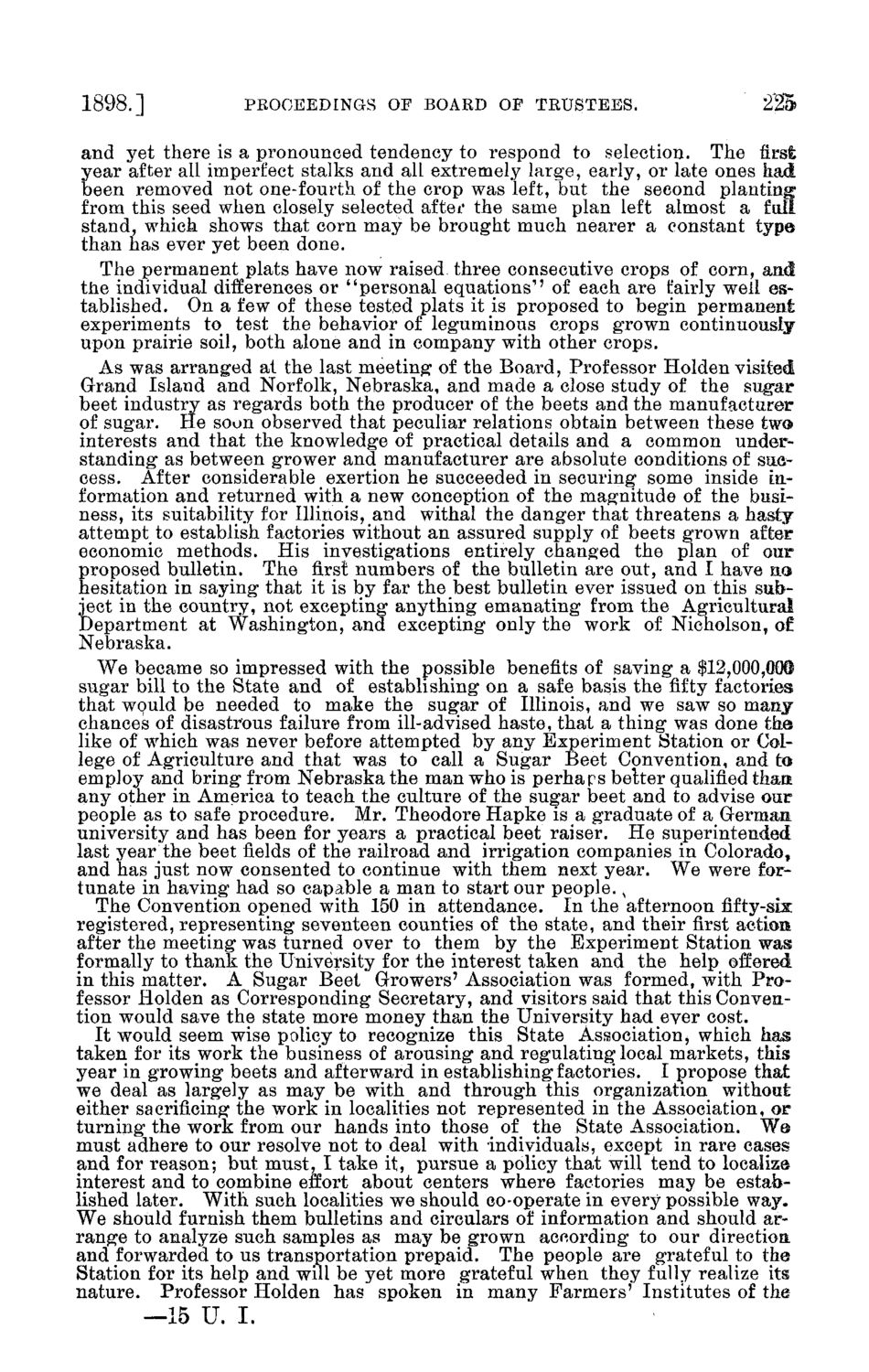| |
| |
Caption: Board of Trustees Minutes - 1898
This is a reduced-resolution page image for fast online browsing.

EXTRACTED TEXT FROM PAGE:
1898.] PROCEEDINGS OF BOARD OF TRUSTEES. 225 and yet there is a pronounced tendency to respond to selection. The first year after all imperfect stalks and all extremely large, early, or late ones had been removed not one-fourth of the crop was left, but the second planting from this seed when closely selected after the same plan left almost a full stand, which shows that corn may be brought much nearer a constant type than has ever yet been done. The permanent plats have now raised, three consecutive crops of corn, and the individual differences or ''personal equations 1 ' of each are fairly well established. On a few of these tested plats it is proposed to begin permanent experiments to test the behavior of leguminous crops grown continuously upon prairie soil, both alone and in company with other crops. As was arranged at the last meeting of the Board, Professor Holden visited Grand Island and Norfolk, Nebraska, and made a close study of the sugar beet industry as regards both the producer of the beets and the manufacturer of sugar. He soon observed that peculiar relations obtain between these two interests and that the knowledge of practical details and a common understanding as between grower and manufacturer are absolute conditions of success. After considerable exertion he succeeded in securing some inside information and returned with a new conception of the magnitude of the business, its suitability for Illinois, and withal the danger that threatens a hastyattempt to establish factories without an assured supply of beets grown after economic methods. His investigations entirely changed the plan of our proposed bulletin. The first numbers of the bulletin are out, and I have no hesitation in saying that it is by far the best bulletin ever issued on this subject in the country, not excepting anything emanating from the Agricultural Department at Washington, and excepting only the work of Nicholson, of Nebraska. We became so impressed with the possible benefits of saving a $12,000,00(1 sugar bill to the State and of establishing on a safe basis the fifty factories that would be needed to make the sugar of Illinois, and we saw so many chances of disastrous failure from ill-advised haste, that a thing was done the like of which was never before attempted by any Experiment Station or College of Agriculture and that was to call a Sugar Beet Convention, and to employ and bring from Nebraska the man who is perhaps better qualified than any other in America to teach the culture of the sugar beet and to advise our people as to safe procedure. Mr. Theodore Hapke is a graduate of a German university and has been for years a practical beet raiser. He superintended last year # the beet fields of the railroad and irrigation companies in Colorado, and has just now consented to continue with them next year. We were fortunate in having had so capable a man to start our people. N The Convention opened with 150 in attendance. In the afternoon fifty-sis: registered, representing seventeen counties of the state, and their first action after the meeting was turned over to them by the Experiment Station was formally to thank the University for the interest taken and the help offered in this matter. A Sugar Beet Growers' Association was formed, with Professor Holden as Corresponding Secretary, and visitors said that this Convention would save the state more money than the University had ever cost. It would seem wise policy to recognize this State Association, which has taken for its work the business of arousing and regulating local markets, this year in growing beets and afterward in establishing factories. I propose that we deal as largely as may be with and through this organization without either sacrificing the work in localities not represented in the Association, or turning the work from our hands into those of the State Association. We must adhere to our resolve not to deal with individuals, except in rare cases and for reason; but must, I take it, pursue a policy that will tend to localize interest and to combine effort about centers where factories may be established later. With such localities we should co-operate in every possible way. We should furnish them bulletins and circulars of information and should arrange to analyze such samples as may be grown according to our direction and forwarded to us transportation prepaid. The people are grateful to the Station for its help and will be yet more grateful when they fully realize its nature. Professor Holden has spoken in many Farmers' Institutes of the —15 U. I.
| |